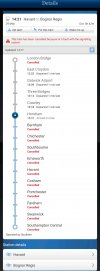To be fair it's a bit harsh to always blame the staff on the ground. Often we can only act on the information passed down from above. Without that any information given out could be incorrect.
Also when stopped at a signal often the only response you get from the GSM-R is 'wait'. That's ok if the signaller thinks it's only for a few minutes but 10 mins later and the same response gives you nothing to tell your passengers other than apologies. Yes the signalmans busy and so are control,and if it's quite a serious problem you are then held in a queue waiting for your phone call to be answered. After all it's not just your train they're dealing with.
I personally think being told I have no information is better than silence.
Most times when one of the evening fast trains from Surbiton was late into Woking there would be silence.
In the past when there has been disruption and no trains or alternative buses between Guildford and Woking for over an hour, there has been no information given out over the tanoy as to which alternative routes to take, such as going via Aldershot. That hasn't even been suggested online.Yes, and it's all quite obvious really but unfortunately there are people on the railway, and this forum, who take the view that delays and the reason for them are none of passengers' business and they try to be as evasive as possible.
Most people aren't stupid, they know if there is a signal fault or someone has jumped in front of a train they are going to be delayed and there is nothing rail staff can do to reduce the delay. However, they do want to know what is going on, an approximation of the delay and to be informed of developments. Also, assuming they are at a station and not stuck on a train, they want to know whether there are any alternative routes or services they can take to minimise the delay.
Perhaps things have improved since then. This was under South West Trains.
As for using a help point during disruption at night. My experience always ended in failure. Again this was a while ago. Twitter now helps.

 .
.

